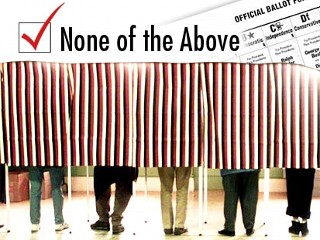I've been following the rise of an independent majority over the last few months with some interest. The headline for the most recent Pew Research report on 'trends in political values and core attitudes' reads: Independents Take Center Stage in Obama Era. Pew sums up their findings:
the percentage of self-described political independents has steadily climbed, on a monthly basis, from 30% last December to 39% in April. Taking an average of surveys conducted this year, 36% say they are independents, 35% are Democrats, while 23% are Republicans. On an annual basis, the only previous year when independent identification has been this high was in 1992 when Ross Perot ran a popular independent candidacy.When a respondent tells pollsters in such surveys that they consider themselves an Independent rather than a Republican or Democrat, they are then asked whether they "lean more to the Republican Party o
 r Democratic Party." In other words, the immediate response to a declaration of independence from the duopoly game is not something along the lines of 'do you affiliate yourself with the Libertarian Party, the Green Party, the Constitution Party etc.?' but rather: no, come on, really, which one of the duopoly parties do you support? Even in the face of such prodding, independents for the most part maintain their independence. The poll found that "more independents “lean” Democratic than Republican (17% vs. 12%)," which is to say, around 70% of independents report that they lean toward neither the Democratic nor Republican Parties. This is the difference between the swing voter, who is still trapped within a duopolist mentality, and the actual independent. Perhaps, following Richard Winger's lead, this latter group should be called 'independent independents'.
r Democratic Party." In other words, the immediate response to a declaration of independence from the duopoly game is not something along the lines of 'do you affiliate yourself with the Libertarian Party, the Green Party, the Constitution Party etc.?' but rather: no, come on, really, which one of the duopoly parties do you support? Even in the face of such prodding, independents for the most part maintain their independence. The poll found that "more independents “lean” Democratic than Republican (17% vs. 12%)," which is to say, around 70% of independents report that they lean toward neither the Democratic nor Republican Parties. This is the difference between the swing voter, who is still trapped within a duopolist mentality, and the actual independent. Perhaps, following Richard Winger's lead, this latter group should be called 'independent independents'.







No comments:
Post a Comment